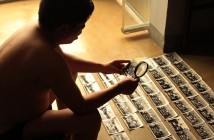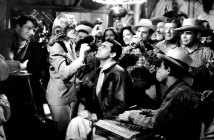
Editor’s Notes: Key Largo, I Confess, Young Maverick, RKO Varieties Triple Feature, & Dr. Kildare are currently available on their respective home entertainment formats.
Key Largo

Key Largo (Warner Archive) stars Humphrey Bogart as ex-GI Frank McCloud, who visits the widow (Lauren Bacall) and father (Lionel Barrymore) of a man who died under his command. They run a hotel in the Florida Keys, and when McCloud arrives, he discovers that sadistic mobster Johnny Rocco (Edward G. Robinson) and his henchmen have holed up there as fugitives. With a hurricane fast approaching, a standoff between McCloud and Rocco forms the film’s primary dramatic conflict.
Based on Maxwell Anderson’s unsuccessful 1939 play of the same name, Key Largo was directed by John Huston (The Maltese Falcon). With Bogart and Bacall heading the cast, the film is an exciting melodrama with excellent supporting performances by Barrymore, Thomas Gomez, and Claire Trevor, who won the Best Supporting Actress Oscar as Rocco’s hard-drinking, heart-of-gold moll.
Bogart’s McCloud is a man still scarred by the horrors of war. The tense situation at the hotel and the trigger-happy presence of Rocco create considerable suspense as McCloud has to decide whether to take action when innocent lives are at stake.
Though Bogart is top billed, Edward G. Robinson has the more flamboyant role and steals every scene he’s in. Rocco’s attraction to Nora is creepy as he watches her squirm while whispering obscenities in her ear. Robinson channels his tough-guy persona from earlier Warner gangster films, particularly Little Caesar.
Key Largo marked the fourth and final screen collaboration between Bacall and her husband Humphrey Bogart. The exciting final scene has nothing to do with Anderson’s original play. It was scripted by Huston and Richard Brooks and, under Huston’s direction, makes for a slam-bang wallop.
There are no bonus features on the unrated Blu-ray release.
I Confess

I Confess (Warner Archive), one of Alfred Hitchcock’s lesser-known motion pictures, uses a familiar premise: the protagonist is thrust into a dangerous situation and must extricate himself despite what appear to be insurmountable hurdles. Father Logan (Montgomery Clift), a Quebec priest, hears the confession of murderer Otto Keller (O.E. Hasse) and is tormented not only by the secret he must keep because of the sanctity of the confessional, but also by the police, who come to suspect that Logan himself is guilty.
Hitchcock made this picture in 1953, just before his series of big-budget color masterworks — Dial M For Murder, To Catch a Thief, Vertigo, and North By Northwest. Compared to those films, I Confess falls short. It’s a suspenseful thriller, but Clift’s performance is rather stiff. Hitchcock’s impatience with his star’s Method acting shows in Clift’s performance and the overall movie. The movie also is hurt by a small budget.
Despite some attractive black-and-white photography of Quebec by Robert Burks and able supporting performances by Anne Baxter, Karl Malden, and Brian Aherne, the movie lacks Hitchcock’s trademark humor and irony and so never rises above a routine thriller. Its straightforward, deadly serious narrative might be acceptable with a lesser director, but expectations are much higher when “Directed by Alfred Hitchcock” appears on the screen. Visually, the film doesn’t have the elegance of composition of Strangers on a Train, made two years earlier. I Confess ranks as second-tier Hitchcock — still well worth watching but not up to the legendary director’s best.
Special features on the Blu-ray release include a making-of documentary; newsreel footage of the film’s premiere; and theatrical trailer.
Young Maverick: The Complete Series

Young Maverick: The Complete Series (Warner Archive) was an attempt to recapture — twenty years later — some of the magic of Maverick, one of the biggest TV hits of the late 1950s that starred James Garner as gambler Bret Maverick.
The title character of Young Maverick is Ben Maverick (Charles Frank), the son of Bret’s first cousin Beau Maverick. Ben is Harvard-educated and inherited the family’s good looks and charm along with its traditions of gambling, willingness to bend the law whenever profitable, and the belief that cowardice was the best way to avoid being killed on the rough frontier. With the help of original series stars James Garner and Jack Kelly, the character of Ben was introduced in a TV movie called The New Maverick (included in this collection) that served as pilot for the new series.
Ben’s frequent nemesis, partner, and romantic interest, Nell McGarrahan (Susan Blanchard), is a sharp grifter in her own right who hopes to marry Ben one day. Marshal Edge Troy (John Dehner) always seems to be on hand to protect Ben from bodily harm. He had arrested Ben’s father many years earlier. All business, Marshal Troy never understood Ben’s humor.
Mr. Frank and Ms. Blanchard were already well acquainted before the series aired. They spent a number of years playing husband and wife on the ABC daytime soap opera, All My Children, and were married in real life.
Young Maverick premiered on November 28, 1979. Its final broadcast was January 16, 1980. Only six hour-long episodes were aired, leaving two that were filmed but never shown. All eight episodes appear in this set. Guest stars include James Woods, Donna Mills, George Dzundza, Howard Duff, Harry Dean Stanton, and Morgan Fairchild.
RKO Varieties Triple Feature

RKO Varieties Triple Feature (Warner Archive) is a collection of three anthology films made up of musical and comedy shorts from the RKO library. Comedian Gil Lamb hosts Make Mine Laughs (1949), which features Ray Bolger, Joan Davis, Frances Langford, Anne Shirley, Dennis Day, Frankie Carle & His Orchestra, and others.
Variety Time (1948) contains a comedy routine by “newcomer” Jack Paar, who would later go on to host The Tonight Show from 1957 to 1962. It also features Pat Rooney, Leon Errol, Edgar Kennedy, and ventriloquist Robert Lamouret. Being a fan from his days on The Tonight Show, I enjoyed seeing a young Jack Paar starting out in show biz.
Footlight Varieties (1951) features performers from radio, motion pictures, and television, including Liberace, Jerry Murad’s Harmonicats, Red Buttons, the Sportsmen Quartet, and gypsy dancer Inesita.
All three films contain archive footage from the RKO vaults and clips from feature films, including Radio City Revels. Each film runs around one hour and gives an idea of the pop-culture entertainment of the period. Some of the performers were veterans of vaudeville, others made their careers on radio, and still others were known mostly from film work. Often, these clips come from less-than-excellent B pictures, so it’s nice to see just the highlights.
This DVD release is unrated.
Dr. Kildare: The Complete Fifth Season

Dr. Kildare: The Complete Fifth Season (Warner Archive) is a 7-Disc DVD set containing all 58 episodes of the show’s final season. If this seems like a lot of episodes for one season, it’s because the show was no longer a once-weekly one-hour drama but a twice-weekly half-hour series with storylines stretched over multiple installments. It is also the first season the show was broadcast in color.
The season opener, Behold the Great Man, stars James Mason as Dr. Becker, an arrogant physician who becomes vindictive when Kildare (Richard Chamberlain) openly disagrees with him. The Bell in the Schoolhouse Tolls for Thee” begins a six-episode story in which Kildare takes on a teaching assignment to three difficult third-year medical students. “The Life Machine” is about a potentially life-saving new treatment at Blair General available only for a limited number of people; Kildare and Gillespie must choose from dozens of possible patients. Other episodes focus on the diagnosis of a mysterious disease, a doctor deciding whether to give up his practice in the slums for a well-paying specialty, and a patient’s change in outlook on life after a near-brush with death.
Guest stars in Season 5 included Dean Stockwell, Cloris Leachman, Fred Astaire, Audrey Totter, Kim Hunter, Darren McGavin, Basil Rathbone, James Earl Jones, Ricardo Montalban, Martin Balsam, William Shatner, John Saxon, and George Kennedy.
Dr. Kildare, which came to TV after having been a successful series of movies in the 1940s, focused on a young intern in a large metropolitan hospital trying to learn his profession, deal with the problems of the patients, and win the respect of the senior Dr. Gillespie (Raymond Massey), Kildare’s mentor and father figure. By Season 3, Kildare was promoted to resident.
The series offered a realistic portrayal of hospital life and the life-and-death reality of the work. The show premiered on NBC on September 28, 1961. Its last episode aired on August 30, 1966.



